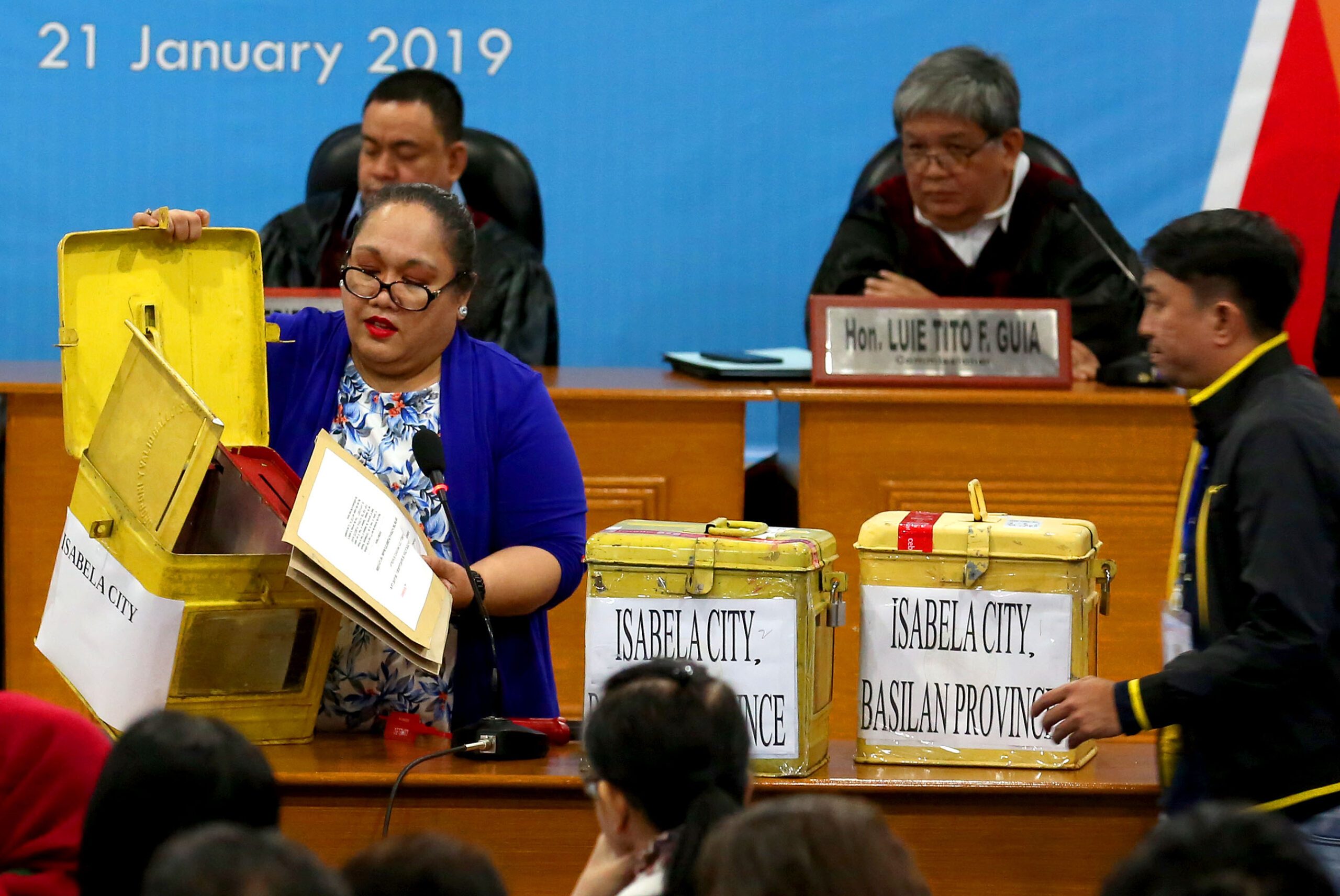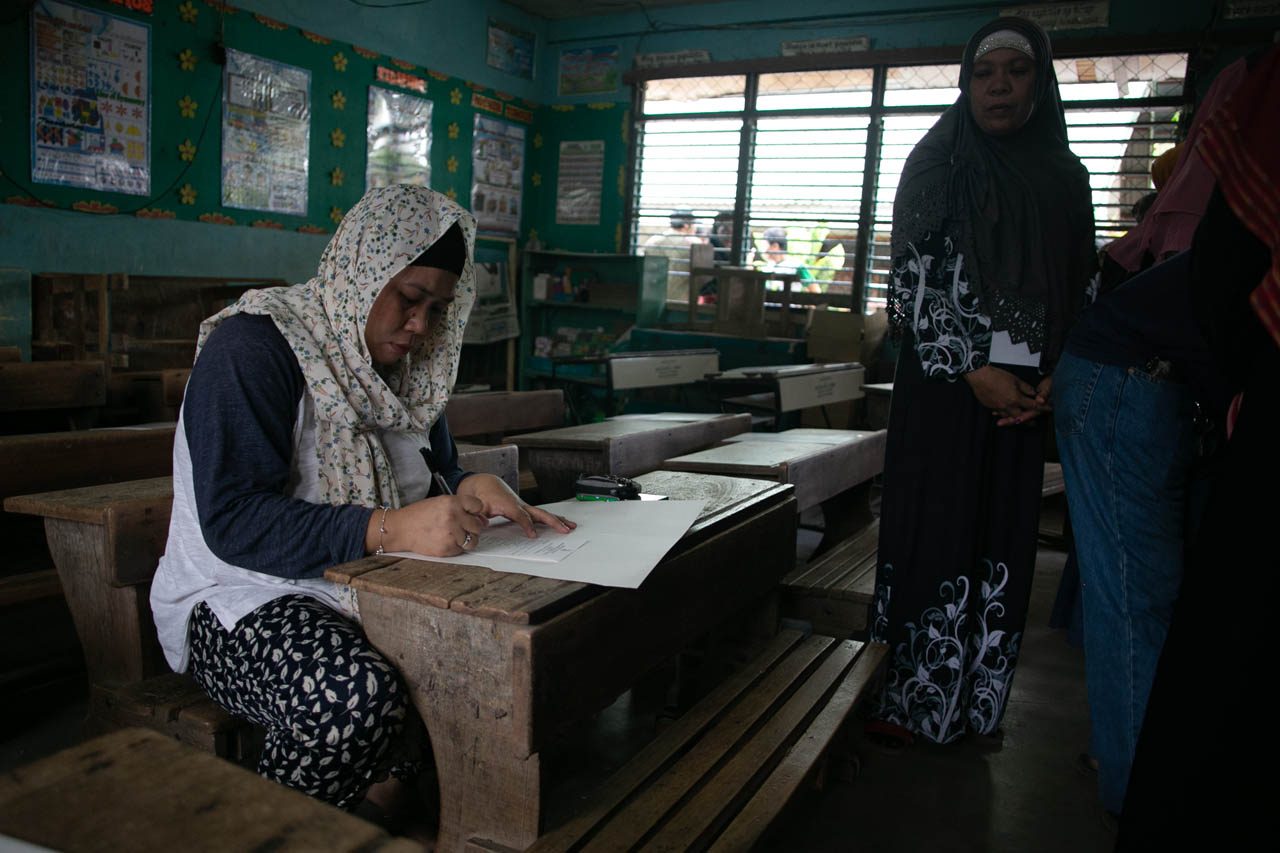SUMMARY
This is AI generated summarization, which may have errors. For context, always refer to the full article.

MANILA, Philippines – Opening a new chapter in their history, the people of the Autonomous Region in Muslim Mindanao (ARMM) voted to ratify the law creating a new Bangsamoro region.
A majority of ARMM voters chose to approve the Bangsamoro Organic Law (BOL) or Republic Act 11054 on Monday, January 21.
On Friday evening, January 25, the National Plebiscite Board of Canvassers (NPBOC) announced the official results of the plebiscite, saying the BOL was “deemed ratified.”
The Comelec, sitting as the NPBOC, also proclaimed that Cotabato City “shall form part” of the Bangsamoro Autonomous Region in Muslim Mindanao (BARMM), while the City of Isabela (in Basilan) “shall not form part” of the BARMM.
The results for the entire ARMM are as follows:
- “YES” to ratifying Bangsamoro Organic Law – 1,540,017 votes
- “NO” to ratifying Bangsamoro Organic Law – 198,750 votes
Here are the results for Cotabato City and Isabela City who were asked if they would want to join the BARMM:
- Cotabato City – Yes: 36,682 | No: 24,994
- Isabela City – Yes: 19,032 | No: 22,441
Ratification means the creation of the Bangsamoro Autonomous Region in Muslim Mindanao or BARMM. It will replace the ARMM, which has been called a “failed experiment” because of its dependence on the national government in Metro Manila and accusations of corruption and mismanagement.
ARMM is composed of 5 provinces: Basilan (excluding Isabela City), Lanao del Sur, Maguindanao (excluding Cotabato City), Sulu, and Tawi-Tawi.
The BARMM, meanwhile, will have more powers and will receive an annual unconditional budget allocation, some P60 billion to P70 billion, from the national government – making it more independent and reducing the need for regional officials to “beg” for funding from Manila.
It will also have a parliament, to be composed of representatives from the current ARMM provinces, additional territories that voted to join BARMM, and representatives for women, Christians, and indigenous peoples.
Expanded territory
The BARMM will also be at least one city larger than the ARMM. Cotabato City, the so-called “crown jewel” and main urban hub of the Bangsamoro region, voted to join the BARMM on Monday. (READ: How Cotabato was won)
Twice before, Cotabato City had refused to join ARMM – voting “no” in 1989 and again in 2001.
The hard-won victory of the BOL in the city, however, is being contested by its mayor, Cynthia Guiani Sayadi, the most powerful voice opposing the city’s inclusion in the BARMM.

Cotabato City’s vote, however, does not affect the ratification of the BOL as only a majority of ARMM votes are required for the law’s approval.
Because of BOL’s ratification, a second plebiscite will be held on February 6 in Lanao del Norte (except Iligan City) and 67 barangays in North Cotabato. Six municipalities in Lanao del Norte and 67 barangays in North Cotabato will be asked if they want to join the BARMM.
However, even if they say yes, their mother local government units will also have to agree to their joining the BARMM. This requirement was among the more contentious provisions in the BOL.
Sulu votes ‘no’
Despite the BOL’s landslide victory in most provinces in ARMM, island province Sulu voted against the BOL ratification.
Sulu Governor Abdusakur “Toto” Tan II has filed a petition before the Supreme Court to declare the BOL unconstitutional. He claims Sulu should be allowed to opt out of the BARMM by voting “no,” instead of its votes being lumped together with the rest of ARMM.
He also asserted that the Bangsamoro Parliament to be created by the BOL violates the principle of separation of legislative and executive powers stated in the Constitution. The Bangsamoro law states that the chief minister and Cabinet of the Bangsamoro government will be chosen from members of the parliament.
Despite Sulu’s “no” vote, it will still become part of BARMM because the BOL states all ARMM provinces votes are to be taken as one, instead of per province.
Hopes for peace
The BOL is a culmination of the Moro Islamic Liberation Front’s 40-year struggle for autonomy, including on-and-off talks with the government spanning the administration of 4 presidents.
Finally, under the administraiton of Benigno Aquino III, the MILF signed the Comprehensive Agreement on the Bangsamoro (CAB), which would lay the foundation for the BOL.
A previous version of the BOL, called the Bangsamoro Basic Law, was already being deliberated in Congress on Aquino’s last year in power when the Mamasapano massacre derailed its passage.
Duterte, Mindanao’s first president, resumed efforts with the MILF, this time involving one faction of rival group Moro National Liberation Front (MNLF). In July 2018, he signed the BOL.
Many Moros have pinned their hopes for peace in Mindanao on the BOL. Clashes between the MILF and government troops have claimed 120,000 lives. With its passage, the MILF will now have to fulfill its promise of decommissioning their 30,000 soldiers and firearms. – with Paterno Esmaquel II/Rappler.com
Bookmark these pages:
Add a comment
How does this make you feel?
There are no comments yet. Add your comment to start the conversation.